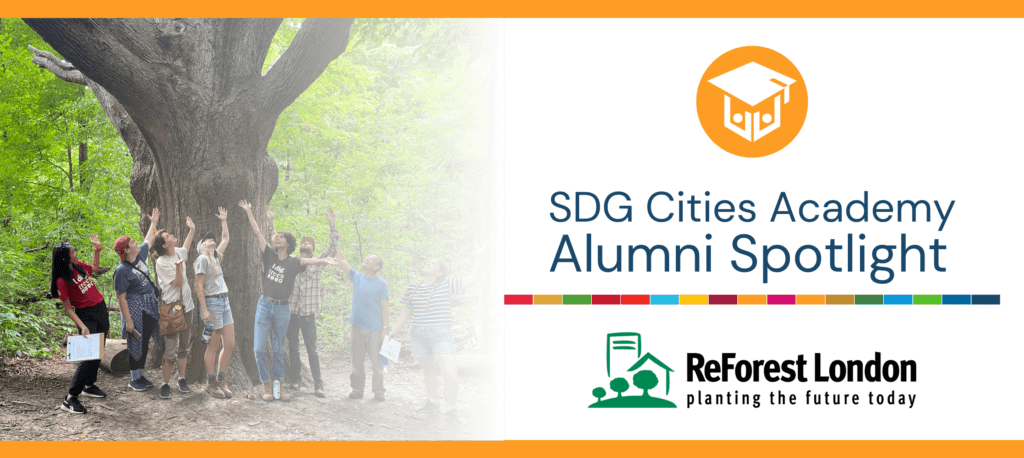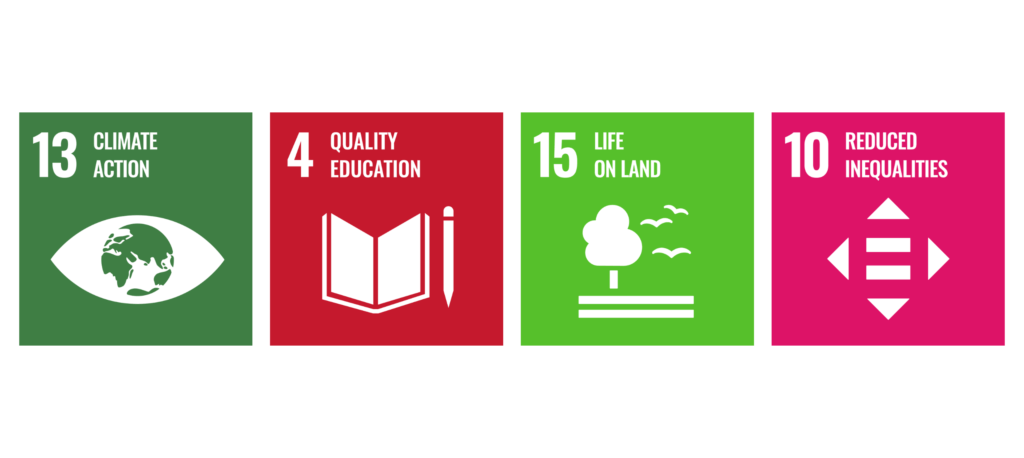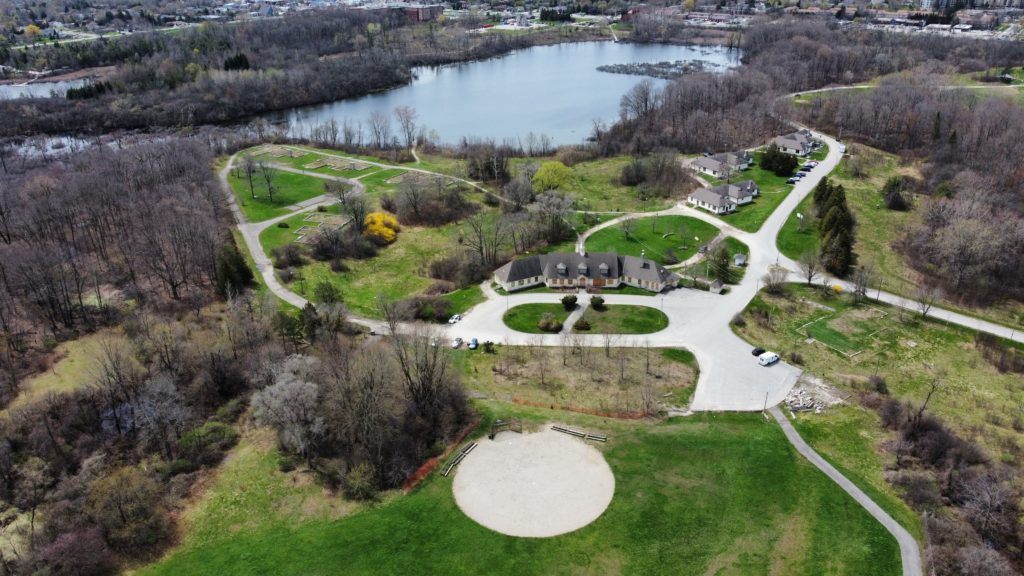ReForest London: bringing communities together in a thriving urban forest

ReForest London is a non-profit organization launched in 2005, based in London, Ontario, with its mission to improve environmental and human health in the Forest City by inspiring, educating, and empowering Londoners through tree planting and to take part in building a more sustainability-focused future for all. ReForest London’s programs, guided by the values of Indigenous knowledge, aim to restore the biodiversity of the Carolinian forest and repair land which has suffered from degradation due to colonial practices. By committing to the principles of putting land acknowledgement into tangible actions and collaborating with Indigenous communities, ReForest London hopes to promote a just and green future where everyone can thrive. Through its initiatives, Reforest London is currently working on SDG13 Climate Action, SDG15 Life on Land and SDG4 Quality Education with principles aligned with SDG10 Reducing Inequalities.

ReForest London launched the Million Tree Challenge (MTC) in partnership with the City of London in 2011, a London and community-wide initiative that renewed and embraced people’s appreciation for the environment and inspired the community to plant trees. Trees are natural carbon capture and storage sinks, capable of absorbing carbon dioxide (CO2) in the atmosphere through the process of photosynthesis then locking it up for years. They represent one of the key ways to address SDG13. Despite the challenges of the pandemic, many businesses, schools, community groups, and other institutions in Forest City joined forces to help green up the city with more than 30 businesses and organizations donating to get trees in the ground. The MTC is an ongoing effort and it has helped plant over half-million trees so far.
ReForest London recognizes that climate change and adaptation is “one of the biggest issues that we have to contend with as a tree planting organization”, says Shaquille Sealy who works at ReForest London and is an alumni of the SDG Cities Academy. As things get warmer, the tree zones and the seed zones have been shifting more northern over time and they are creating a seed corridor to help with the changing climate and vegetation.
New programs, partners and activities
The Westminster Ponds Centre (WPC), a brand new initiative powered by Reforest London has a broader reach than working directly with trees. WPC is London’s first Environment and Sustainability Centre that has already hosted almost 200 workshops. WPC brings together community members through its collaborative services and sustainable initiatives with the focus of promoting health, wellbeing, sustainability, and environmental excellence. Located on the traditional territory of First Nation peoples, the WPC site is known for its rich history and cultural heritage. Built following World War II and formerly a veterans’ recuperative village, the site holds a powerful legacy of serving Veterans and the intersection of nature and mental health.

As part of WPC’s overarching sustainability objective, the Centre currently works on achieving SDGs 4, 11 and 12. By providing nature-based programming and hands-on workshops and activities for children, changemakers, partner organizations and the wider community to address nature-based mental health and wellbeing (SDG3), the WPC is working towards SDGs 4 Quality Education, Green Buildings and Urban Green Spaces (SDG11). In addition, the Centre also focuses on fostering Renewable Energy (SDG7) and achieving SDG12 Responsible Consumption and Production by improving its waste auditing processes for its buildings and new renovations.

Making a difference with the Sustainable Development Goals (SDGs)
The diversification of programs along with the campus hub model that brings together many new partners and workshops was certainly a challenge. Shaquille Sealy, who works as Operations Manager, attended the SDG Academy last year and appreciated getting a deeper understanding of the SDGs. He emphasized that
“learning about the intricacies of sustainability and how they connect to the SDGs have helped us to bring clarity on how to localize the goals. The SDG Cities Academy helped us to see that we are not alone in this journey and it was helpful to learn from other organizations at different stages of incorporating SDGs in their work.”
Shaquille Sealy
Another aspect of the academy that was very valuable to Shaquille is that online materials remained available even after the Academy sessions ended. Both the online course with videos, pdfs and presentations and the Community Harvest, a shared document used during the academy where all participants could add notes.
“Being able to go back to these notes and be able to see what other groups have shared and whatnot is huge. And being able to have access to that pretty much for good is absolutely massive.”
Shaquille Sealy
The WPC continues to make progress toward the SDGs through environmental education programs such as its Signal Boost Initiative, designed to improve the quality and quantity of environmental education opportunities for Londoners for free or low cost. Moreover, the Centre creates impactful programming serving diverse groups of individuals within the local community, such as students and families, with a wide array of opportunities to experience and value nature, the environment and sustainability. The WPC connects many of its partners to the London Environmental Network (LEN) and the wider community to deliver programming for Londoners of all ages and interests. It acts as a hub for environmental action and learning for Southwestern Ontario.
Planting Seeds for the Future
WPC’s Seed Hub, a volunteer-driven program, focuses on seed collection in an ethical way and the creation of educational content for the public about everything seed related. The Hub highlights the importance of growing seeds from native trees and shrubs rather than non-native species that may put the local ecosystem at risk. By connecting with the local community, the hub fosters the growth and diversity of future urban forests and regenerates the land in a sustainable way. Seed Hub hosts a number of events every year which includes a series of hikes to conduct seed forecasting (the act of surveying the flowering and fruiting structures on trees and shrubs) and hands-on collecting, cleaning, and processing of seeds. These events provide an invaluable opportunity for community volunteers to connect in a meaningful way through seed planting and local ecological restoration efforts by increasing the supply of native tree and shrub seeds that will be used in seedling growing and direct planting projects by ReForest London and its partners.
If you are interested in learning more, you can read more about Reforest London’s work here. and the WPC’s programming here.
